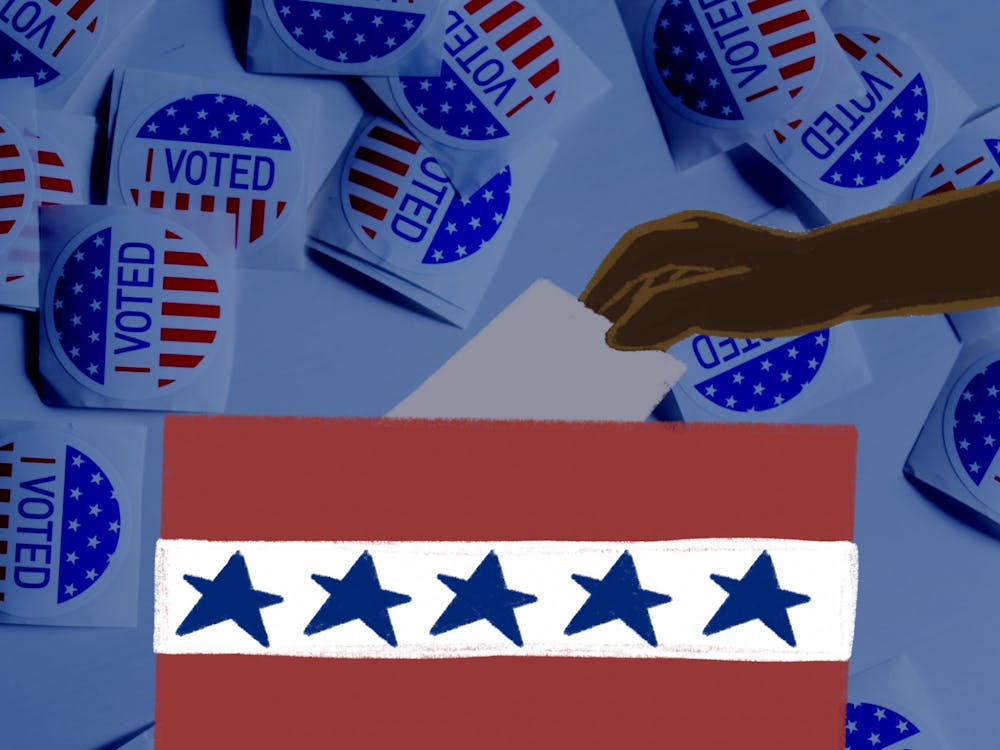Florida lawmakers are looking to make revisions to vote-by-mail. But an East Gainesville pastor worries these revisions could be restrictive to voters in vulnerable communities.
Senate Bill 90, filed by Sen. Dennis Baxley, R-Ocala, would eliminate vote-by-mail drop boxes and make it so voters have to re-register for vote-by-mail ballots more frequently.
“We see this past campaign as a stellar one, bringing out record numbers of people,” Karl Anderson, a 47-year-old senior pastor at Upper Room Ministries, said about record Black voter turnout in November’s presidential election. “Others see it as a threat, unfortunately.”
Senate Bill 90 matches a trend of what many see as restrictive voting legislation throughout the United States meant to suppress voters of color. So far, 28 states have introduced, prefiled or carried more than 100 voting bills that restrict voting access this year, according to a January report from the Brennan Center for Justice. This is three times the number of bills the center classified as restrictive from the previous year.
Anderson’s signature is the second of 13 on a letter sent to the Florida Senate on March 16, written by Black Florida clergymen calling for the bill to be amended. He is the area organizer of the Equal Ground Action Fund, a group that promotes equal access to education about voting and empowerment.
Some Black voters are hesitant to trust vote-by-mail because of research suggesting their ballots may be rejected at a higher rate. Despite the threat of contracting COVID-19, six in 10 Black voters said they voted in person during the 2020 election compared to five in 10 white and Latino voters and three in 10 Asian voters, with most voting early, according to a report from the Pew Research Center.
But for some Black voters, locating a polling place is more difficult than it is for their white counterparts on election day, according to the American Bar Association. And research from the University of Maryland shows that areas with less access to public transportation may see less turnout.
Also, some lawmakers have closed polls in historically Black neighborhoods, forcing Black voters to travel further to cast their vote.
Vote-by-mail drop boxes can alleviate the stress of commuting to a precinct for voters of color, those in low income communities, disabled people and those in quarantine, the clergymen’s letter read.
If the bill is passed and vote-by-mail drop boxes are eliminated, the only alternative to mailing an absentee ballot would be for a voter or an immediate family member to deliver the ballot to the Supervisor of Elections office. It also would make it so voters would have to request mail-in ballots each election cycle, whereas the request was previously valid until the end of the year of the following general election. For instance, voters who requested a mail-in ballot in 2020 would have continued to receive them until 2022, the year of the midterm elections.
Senate Bill 90 has been compared to a bill passed in Georgia on March 26 that made it a misdemeanor to give voters food and water while they’re in line. Championed by Georgia Republicans, the bill also limited drop boxes to the inside of early voting locations in the state and makes it a requirement to have a photo ID to vote as an absentee.
“We find that such a bill will cause undue confusion and exacerbate a prevalent narrative of voter suppression against certain communities,” the letter read, signed by the Florida State Network of African American Clergy Alliances in reference to Senate Bill 90.
The group is demanding the legislature amend the bill to give voters more time to return their vote-by-mail ballots, have more flexible pickup locations, expand the number of optional days to vote early and require the state to perform capacity tests of voter equipment before each election.
The group would also like the bill to allow same-day voter registration and require automatic voter registration — a measure that would make voting an “opt-out” system versus “opt-in,” Orlando Pastor Marcus McCoy, 33, said.
As the organization’s Florida Faith outreach director, McCoy said the letter was meant to reach out to lawmakers on behalf of Black state voters, while showing that the group is willing to work with legislators.
“We don't want to come across as if we're not able to reason,” McCoy said. “But we’re not going to sit quietly as they try to take us back to 1965.”
Some Florida Republicans have thrown their support behind Senate Bill 90 because of national discourse surrounding vote-by-mail potentially increasing voter fraud.
In 2016, former President Donald Trump falsely suggested that ballots were being cast by illegal immigrants and deceased people, and that voter fraud was common in the United States.
However, a 2017 Brennan Center for Justice report revealed the actual rate of voter fraud in the country was around less than 0.01%.
In the 2020 presidential election, vote-by-mail became a talking point for Trump as he consistently tried to diminish trust in mail votes. Although he tweeted that returning a ballot through a third party was “rampant with fraud,” the former presidential candidate used this method himself, NPR reported.
Sen. Baxley said in a Senate Governmental Oversight and Accountability Committee meeting on March 10 that he wants to curb potential voter fraud with Senate Bill 90.
“I am all about staying ahead of whatever problems could develop,” he said. “So, it’s not that there was a debacle and we have to fix it. Do we have to wait for a debacle? Why can’t we take something that is working well and put guardrails on it and keep it safe.”
The pastors’ letter prompted responses from members of the Rules Committee, including Baxley, who met with the group March 23.
During the meeting, Baxley brought up concerns of voter security, though McCoy said Baxley would not answer the group’s question about what data prompted the elimination of drop boxes.
The group of pastors also arranged meetings with four other state senators.
Anderson said he fears what kind of precedent Senate Bill 90 could set in Florida policymaking when it comes to early voting.
In October, Anderson, whose church is located in East Gainesville, encouraged voters in his congregation to vote early after a Sunday service in a “Souls to the Polls” rally.
In the 2020 presidential election, 15% of Alachua County voters were Black — an increase of less than 1% compared to 2016. Similar events to increase Black voter turnout have been held throughout the country during every major election cycle since 1962 to bolster voter turnout in communities of color.
“We want to educate and engage our people,” he said. “If we don't vote, we don't have a voice.”
Anderson worries an amendment may be added to close the early voting window before the last Sunday before election day because a similar bill introduced in Georgia proposed the elimination of all early voting on Sundays, sandwiched among other provisions. This would be a pointed attack on the voting rights of Black Floridians due to the importance of Souls to the Polls events on that Sunday to increase turnout, Anderson said.
“I see it as an attempt to take us back to the early 1900s era of Jim Crow,” he said. “There’s really no other way of looking at it.”
However, during his meeting with the clergymen, Baxley promised he would oppose any amendments that might have this effect.
Former Alachua County Democratic Party Chair Cynthia Chestnut, 71, agrees the bill is unnecessarily restrictive. She said in her more than 30 years in Florida politics, she’s never seen a bill that is as limiting to the state’s voters.
Chestnut and her husband used vote-by-mail drop boxes in the November election. To her, taking them away would dissuade vulnerable voters from dropping off their ballots.
“It appears that the legislation is designed to punish people for voting and to curtail their involvement in the democratic process,” she said. “It's a step backwards.”
Anderson’s concern of having an amendment added at the last minute excluding the last Sunday before an election in the early voting period is not unfounded, Chestnut said.
“Nothing in the legislature has ever been this severe in cutting the voting rights of Floridians,” Chestnut said.
The fate of the Florida bill is now in the hands of the Senate Rules Committee. The committee was supposed to hear the bill on Tuesday, but the hearing was postponed. It is unclear when the committee will vote on the bill as of April 6.
This article has been updated to reflect that 15% of those who voted in the 2020 presidential election in Alachua County were Black. The Alligator initially reported otherwise.
Contact Alan Halaly at ahalaly@alligator.org. Follow him on Twitter @AlanHalaly.

Alan Halaly is a third-year journalism major and the Spring 2023 Editor-in-Chief of The Alligator. He's previously served as Engagement Managing Editor, Metro Editor and Photo Editor. Alan has also held internships with the Miami New Times and The Daily Beast, and spent his first two semesters in college on The Alligator’s Metro desk covering city and county affairs.






